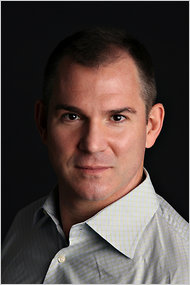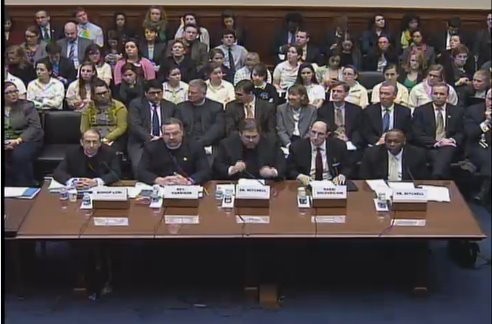Do You Have To Be a Parent To Be A Parenting Expert?
As my husband rocks our 5-month-old daughter back and forth in his arms to give me some time to catch up on work, I can’t help but think about Frank Bruni’s column in last Sunday’s New York Times.
Mr. Bruni has a lot to say about today’s parents. He’s “confounded by the boundless fretting, as if ushering kids into adulthood were some newfangled sorcery dependent on a slew of child-rearing books and a bevy of child-rearing blogs.” He says we’re too permissive, we bargain with kids, and we give them too many choices.
Whether you agree or disagree with Mr. Bruni, his argument is hurt by one glaring fact: He’s not a parent.
Until he knows the awesome responsibility and love that goes into raising a child, the constant worrying about his or her future and the – let’s face it – fear of failure, Mr. Bruni is really in no position to criticize today’s parents. His attempt at mitigating that fact by mentioning the time he spends with his many nieces and nephews just doesn’t suffice.
Mr. Bruni’s column raises an important question for PR professionals trying to identify the right spokesperson: How credible is the person as a spokesperson? For example, are non-parents the best people to deliver messages about parenting? Are men the best messengers to deliver messages about women? Are Democrats the best envoys to deliver messages about what they see as necessary changes within the Republican Party?
Take, for example, last year’s House Oversight and Government Reform Committee hearing on religious liberty and contraceptive coverage. In a hearing that was incredibly important to health care for women, the first of two groups to testify that day consisted of all men. As a result, three Democrats walked out of the hearing, Planned Parenthood circulated a photo of the all-male panel and the Democrats’ narrative that Republicans are insensitive to women’s causes was furthered.
Choosing the right messenger can make or break your reputation, as Brad wrote in this blog post and in The Media Training Bible. The same principle applies when your organization deals with sensitive issues. Don’t let the corporate hierarchy be the sole determinant of who the right organizational spokesperson is. If your CEO isn’t the best person to speak on a specific issue, find someone lower on the food chain who will appear more credible to the public.
Do you share my view or do you think I’ve gotten it wrong? Please leave your thoughts in the comments section below. In the meantime, please follow me on Twitter @PMRChristina.
Christina Mozaffari is the vice president of the Washington, DC office for Phillips Media Relations.
Photo credit: Earl Wilson/ The New York Times





I agree 100%. Until you’ve had the awesome responsibility of waking constantly to make sure your newborn is still breathing and held your breath waiting for your teen to come home on a Friday night, don’t tell parents how to parent or offer your grandiose opinion about what is “wrong” with today’s youth! This goes for columnists, healthcare professionals, teachers, police officers…anyone.
Christina has a point. A parent can talk about the travails of parenting, but I would argue someone removed from parenting could offer insight because he or she can study parental problems with an objective, fresh mind.
I don’t think getting one’s panties bunched over a non-parent giving parenting advice does much good. What does better is listening and finding the nuggets of insight that “actually” resonate and offer possible solutions.
Fact is, I had no idea what it was about until I got there. Mr. Bruni can’t possaibly understand either. I used to make fun of the safety parents. Now I am one. My panties aren’t in a bunch, but he simply doesn’t have the perspective — or the insight — you need.
I think this is so bogus. Parents may have more insight than non-parents, but that doesn’t mean non-parents can’t give advice or have DIFFERENT insights. In my opinion, which, apparently, is completely invalid because I am not a parent, Bruni offered some common-sense advice. Parents who bristle when they hear advice they don’t want to follow should focus on the content of the advice and not the source.
Since I’m the editor of this blog, I should jump in here and share my views about Christina’s piece.
First, the comments here are a microcosm of the debate that played out in the comments section of The New York Times. In many ways, that very split of public opinion reinforces the main point of Christina’s piece — that the messenger matters. For example, imagine two messengers delivering the exact same message about certain ills within African American culture: Bill Cosby and a privileged white rich guy. Which messenger do you think will be received more openly by more African Americans?
Second, I think Bruni failed in two places. His piece lacked humility, and it lacked hard data. As a result, it came across as opinionated but lacked intellectual curiosity. To Deborah’s point, I personally do think non-parents can have valuable insights into parenting. But Bruni didn’t make his case. I would have been much more impressed with his argument if he had interviewed parents, done some academic research into the topic, or referred the vast and growing body of social science about parenting.
I’ve been a father for just under three weeks. I’m about as far from a parenting expert as anyone. But I’ve learned enough in those three weeks to know not to throw broadsides at all other parents for reading blogs and expressing curiosity about parenting books. In my case, for example, I was against allowing our son to use a pacifier (a crutch for lazy parents who didn’t have the patience to sooth their screaming child, I thought). Guess what? After three weeks of a screaming child who instantly calms down when sucking on a pacifier, he’s using one now – with the pediatrician’s blessing. So much for what I thought I knew about parenting. Experience is a great way to form a more informed opinion – but it isn’t the only way.
Let’s keep the conversation going! Thanks to all of you for reading.
Brad
I agree with Deborah: Inexperience doesn’t mean you should be mute or automatically discounted. Besides, many writers who are parents give terrible advice, and others come across as holier than thou.
I also agree that when choosing a spokesperson, perception is important. All men talking about women’s issues is a great example.
Whether someone *should* be respected as an adviser and whether they *will* be may be two different things. This post is good fodder for thought.
Sure, people who have not been parents can give advice. Heck, I’ve been babysitting — changing diapers and the whole shebang — since I was 12. I didn’t have a baby until my 30s, but I sure knew a lot about babies by the time I did.
But Bruni made two fatal flaws. He generalized about all parents, when in reality, a lot of what he is complaining about would apply only to his small sample of parents of his acquaintance. So he can complain about THEM all he wants, but once he starts addressing “Parents” he’s lost most of us. We see right through that.
The second flaw is that he offered advice. Hey if he wants to bitch about how annoying he finds parents, that’s his right. But he’s not entitled to offer advice anymore than I’m entitled to offer advice to combat soldiers on how to conduct themselves on the battlefield — because I have not been there and I wouldn’t know what I was talking about. Do I know soldiers, sure! Do I know what goes on in combat, to an extent, sure? Does that entitle me to give an opinion on it, no.
Humility. Write about what you know. Something every writer needs to keep in mind — that’s so basic.
Parenting IS freaking combat duty and anyone who has not been a parent can not possibly appreciate that. And YES we are over-sensitive about it! Anyone who has been a parent is over-sensitive about parenting critiques. We’re probably so touchy because we’re so doggone tired 🙂 So yeah, the last thing we want to hear is some child-less pompous ass tell us how to do it.
This article would have been so much stronger if it had been written by a father or mother who stuck to his or her personal experiences, or as you say, offered data and hard facts.